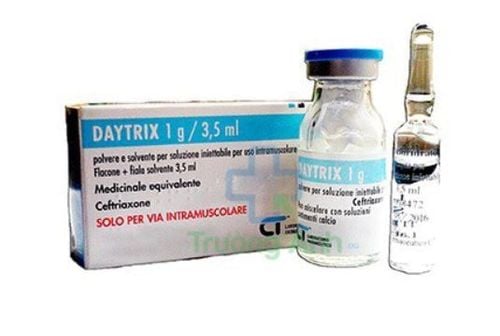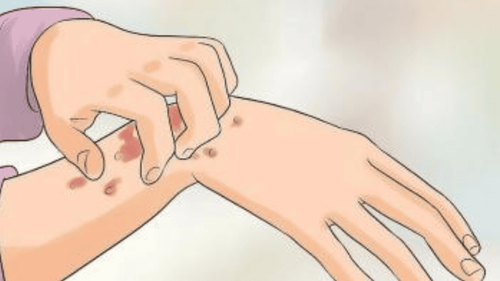This is an automatically translated article.
Syphilis progresses through 4 stages, the symptoms of the disease depend on each stage. However, the symptoms may not progress in the same order. You can be infected without any symptoms.
1. What is syphilis?
Syphilis is a sexually transmitted disease caused by the bacterium Treponema pallidum. Through open wounds, scratches on the skin, bacteria will enter the body. The disease is spread mainly through sexual contact but can also be passed from mother to child.

Bệnh giang mai là bệnh lây nhiễm qua đường tình dục
2. Syphilis warning symptoms
Symptoms of syphilis depend on the stage of the disease, including:
Stage 1 : small sores appear around the penis, anus, vagina or rectum, in rare cases appear in or around the mouth. Most people will not notice this sore because it is usually painless and can heal on its own in 3-6 weeks with or without treatment. Once the ulcer disappears, you must continue to treat the disease to prevent it from getting worse. Second stage: at this stage, the person may have a rash, swollen lymph nodes, and fever. The rash will start on the trunk and gradually cover the whole body, including the palms and soles, without itching. Patients may experience fatigue, sore throat, headache, weight loss, swollen glands and muscle pain, or hair loss. In addition, patients at this stage may also experience pain in the mouth, vagina or anus. Symptoms at this stage may go away even if you don't get treatment. However, the disease can also progress to a latent stage if the treatment is not correct. The third stage: if the patient is not treated properly and timely, the disease will progress to neurosyphilis and optic syphilis. At this stage, the sick person cannot infect others, but the mother can still pass the infection to her baby. Often at this stage, the person will not see any signs or symptoms of the disease. If left untreated, you can continue to carry syphilis for many years without any signs or symptoms. If you don't get treatment right away, the symptoms will probably go away temporarily but it will come back. This can happen in a year. Even if the symptoms of the disease do not return, the disease-causing bacteria remain in your body. Syphilis will get worse, and you can still infect your partner. The fourth stage: this is the extremely dangerous stage of syphilis. Once at this stage, many organs in the body can be affected and affected, including the heart, blood cells, brain, and nervous system. Signs and symptoms appear 10 to 30 years after infection. At this stage, the disease will damage organs and can lead to death, destroying the nervous system. Neurosyphilis and visual syphilis: untreated syphilis can cause damage to the brain, nervous system (neurosyphilis) or eyes (optical syphilis). This is the final stage of the disease. Common signs include: Brain (nerve) problems; Infection, inflammation of the membranes around the brain and spinal cord; Numb; Deaf; Vision problems or blindness; Personality changes; Dementia; Heart valve disease; Aneurysm... A pregnant woman with syphilis can pass the infection to her unborn baby. Doctors call this congenital syphilis. If left untreated, the fetus is at high risk of stillbirth, and the newborn is at high risk of death.
Most babies born with syphilis have no symptoms. Some may develop a rash on the palms or soles of the feet. Newborns with syphilis often have the following symptoms:
Abnormally enlarged liver Jaundice Inflammation of the gland, abnormal development of the brain.
3. Who should be tested for syphilis?
Any person with warning signs or symptoms of syphilis should be tested for an accurate diagnosis. Also, anyone who has sex, in case your partner is diagnosed with syphilis, you should get tested for the disease.
Some people should be tested (screened for) for syphilis even if they have no symptoms.
In addition, some of the following cases need to be regularly checked for syphilis, including:
Pregnant women; Men who have sex with men (MSM); People who have HIV and are sexually active People who are taking PrEP (HIV prophylaxis) to prevent HIV.

Phụ nữ mang thai cần xét nghiệm giang mai để tránh lây nhiễm sang thai nhi
4. Syphilis prevention
Anyone is at risk of syphilis through unprotected sex. The best way to avoid the transmission of sexually transmitted diseases, including syphilis, is to avoid having sex without knowing your partner's health status.
To reduce your risk of catching the disease, you can follow some of the following guidelines:
Comprehensive health check Use condoms to prevent syphilis infection, avoid direct contact with sores. Syphilis can be completely cured with the use of antibiotics in high doses. However, treatment may not reverse any damage caused by the disease if the disease is left untreated for a long time.
Vinmec International General Hospital offers a Package of Examination and Screening for social diseases to help customers detect diseases early and have effective treatment and prevent dangerous complications. The screening package for social diseases at Vinmec is for all ages, both men and women.
When registering for the Social Disease Screening Package, customers will receive: Dermatology specialist examination; Perform tests such as: HIV Ab rapid test, Chlamydia rapid test, Treponema pallidium rapid test, qualitative and quantitative Treponema pallidum TPHA test, bacteriological smear test and staining fungal test soi...
To register for examination and treatment at Vinmec International General Hospital, you can contact Vinmec Health System nationwide, or register online HERE.
Reference source: Webmd.com; Cdc.gov
SEE ALSO:
Syphilis: Causes, transmission, signs to recognize Syphilis can be transmitted from mother to child through the placenta How is syphilis treated?













